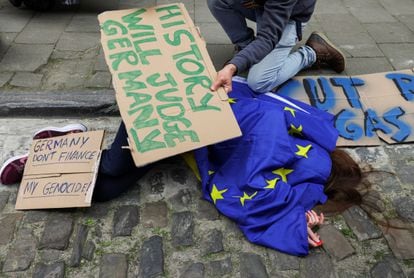Climate activists protest this Friday against Germany for its refusal to ban the import of Russian hydrocarbons in front of the German embassy in Brussels. JOHANNA GERON (REUTERS)
"Hundreds of thousands of jobs would be at risk."
"Our country and all of Europe would sink into a recession."
Just a month ago, German Chancellor Olaf Scholz justified his refusal to immediately cut off the Russian gas tap.
His words, spoken in the German Parliament, resonate again today in Berlin after the Bundesbank has warned of the same thing in its latest monthly report, published this Friday.
An embargo on Russian energy imports would mean a reduction in German gross domestic product (GDP) of 5% compared to the projections made in March by the European Central Bank and 2% compared to the GDP of the previous year and would plunge the country into a recession.
The central bank's report comes at a critical time for Olaf Scholz's coalition government, which is facing mounting pressure to ban Russian gas imports.
Climate activists protested this Friday outside the German embassy in Brussels against Berlin's refusal to cut off the gas tap.
Politicians and academics have been debating for weeks what consequences the embargo would have for the German economy and how prepared it is to continue operating without the hydrocarbons controlled by the Kremlin.
Berlin is one of the largest European consumers of Russian gas, with which it feeds the powerful industrial sector, the basis of its export power.
The fear of an economic disaster such as the one now raised by the Bundesbank has made Germany, along with Austria and Hungary, one of the countries opposed to including the energy embargo in the successive sanctioning packages that Brussels has been approving.
In the last, the fifth, decided after learning of the atrocities committed by the Russian Army in the Ukrainian city of Bucha, Berlin gave in to an embargo on Russian coal.
It is assumed that oil and gas will follow, but it will not be immediate.
Germany needs time to shake off its energy dependency on Russia, which its foreign ministers favored for so many years.
The calendar handled by Berlin, announced before agreeing on the fifth package of sanctions, is as follows: the country could do without coal in the summer;
of oil at the end of the year, and of gas in mid-2024. This was announced by the Minister of Economy and Climate, the green Robert Habeck.
Cutting off the tap earlier, now, would have catastrophic consequences, as the Bundesbank report points out.
The estimate of its experts is more pessimistic than that of other economic institutes and universities.
Last month nine economists from various universities published a report calling the embargo's economic effects "manageable."
In his calculation, GDP would contract between 0.5% and 3%.
In 2020, German GDP fell by 4.5% due to the pandemic.
The publication increased the pressure on Scholz, who responded by accusing economists on public television of "irresponsibility" for developing mathematical models "which then do not work".
Foreign Ministry experts do not agree that the consequences of the immediate embargo are "assumable", nor is the industry.
Different associations have warned of "massive job losses" if Russian gas stops flowing to the metallurgical, chemical or steel sectors.
Some experts have also warned that the closure of some sectors, such as chemicals, would affect the production of other basic materials in Germany because the production chains are closely connected.
The Bundesbank report points to another problem of particular concern in Germany: rising prices.
The country has pulverized its inflation record since reunification, standing at 7.3% in March.
If there were to be a sudden Russian power outage, inflation would soar another 1.5 percentage points this year, raising the risks of dreaded stagflation — an economy stagnating while prices continue to rise.
The central bank's analysis ensures that the 5% hit to growth would push the economy into a severe recession, as overall GDP would shrink by 2%.
An abrupt interruption of Russian energy would "significantly" limit national production, Bundesbank experts say.
The affected sectors would have to reduce the use of natural gas, coal and oil by 40% between the second quarter of 2022 and the end of the year.
Under the conditions of the analysis, "there are no options for substituting fossil fuels in the current year," the report states.
The embargo, therefore, would result not only in an increase in prices, but also in energy rationing for which the Scholz government is already preparing.
Last month, the economy minister took the first formal steps to activate his emergency law, which provides that the industry will stop receiving gas if supply does not meet demand.
The homes of the 83 million Germans would have preference when using heating and hot water.
The activation of the alert phase occurred after Vladimir Putin threatened to cut off supply if Europe did not give in to paying for energy in rubles.
In the simulation carried out by the Bundesbank, industrial consumers would not be able to replace Russian gas with other energy sources for three consecutive quarters, which would cause a stoppage with serious consequences.
Germany is working hard to reduce its dependence on Russian hydrocarbons.
Before the invasion of Ukraine, 55% of the gas it imported came from Russia;
in a few weeks he has managed to reduce the percentage to 40%.
Plans to build regasification plants - Germany lacks these necessary facilities to import liquefied natural gas - have accelerated and the Government is preparing several legislative changes to promote renewable energies.
But as Scholz assured the Bundestag, it is impossible to do without Russian energy overnight.
or possible,








